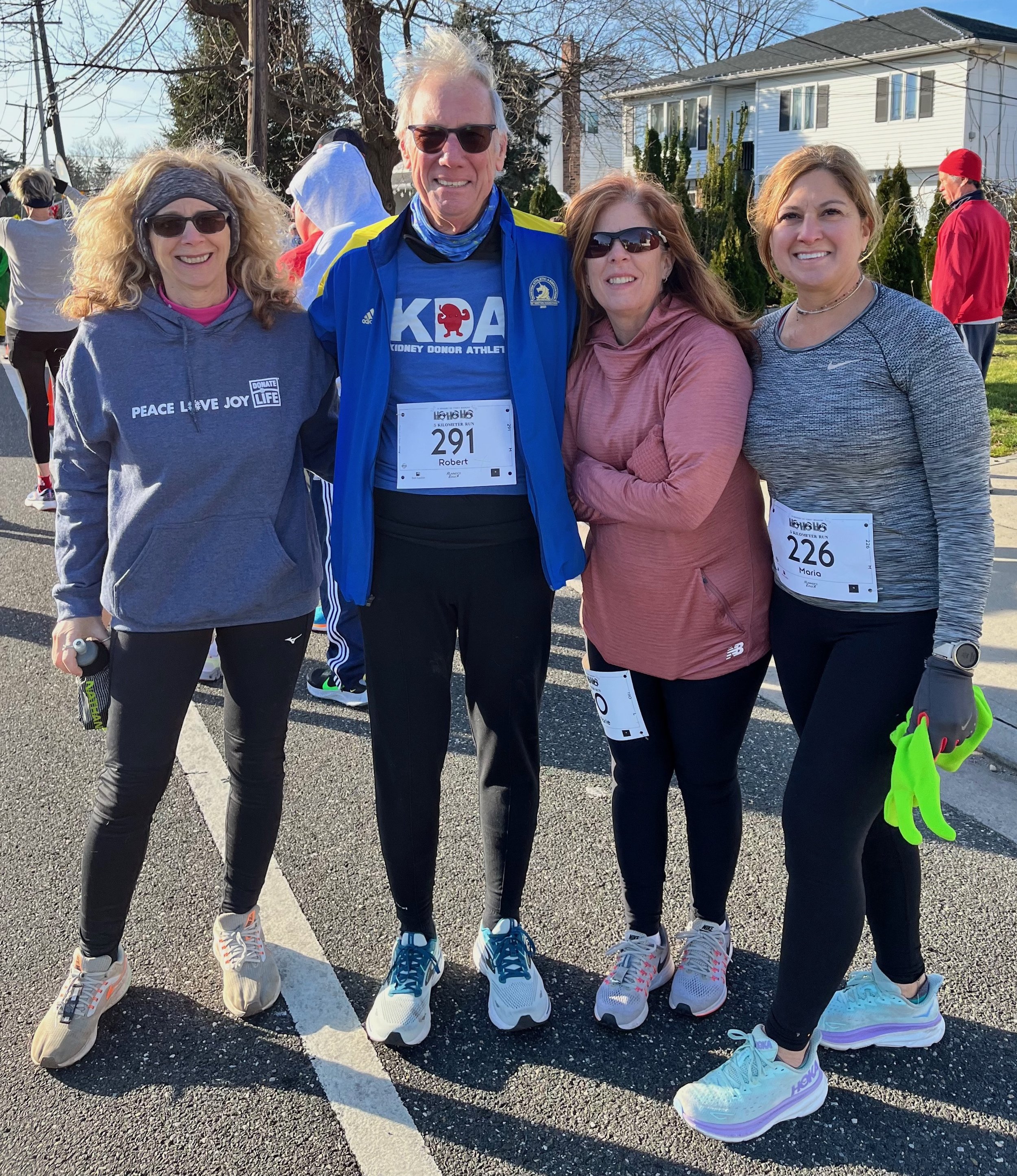Ol’ Lefty - He Left
Living Kidney Donor - Bob Goldfarb’s Donation Journey
At 72 years old, Bob Goldfarb ran the TCS New York City Marathon on November 5, 2023. Just three weeks later, on November 29, he altruistically donated one of his kidneys to a stranger.
Bob lives in New York and ran the marathon as part of Fred’s Team, raising money and awareness for lifesaving cancer research at Memorial Sloan Kettering in honor of his friend’s granddaughter. Diagnosed at just two and a half years old, she had recently completed chemo and radiation, and is now in remission at five years old. Bob ran to celebrate her.
Bob’s journey to becoming a runner began later in life. He said that growing up he hated running, and explained how he used to cheat in school by cutting across the hallways they ran. But in his mid 50’s, a friend challenged him to run a 5K for AIDS. Bob agreed. He said, “I did the 5K and wished I never ran again.” But then he ran for the Leukemia and Lymphoma Team in Training Program, and then he discovered marathons, and eventually became an Ironman.
Bob’s journey to non-directed living kidney donation also began later in life. Two years ago, he took his friend, Mindy, home from the hospital after she donated. Her pain and discomfort were obvious as she shared her experience with him. To Bob it was an experience he did not think he wanted to replicate. She wasn't very comforting to him at the time. But as they drove home and she was talking about the experience, and combined with seeing her recuperation and her first 5K run, then her next 10K run, Bob realized that the effects were going to be small and for a short period of time.
After discussing the possibility of donation with his wife, Pam, they thought about it for a year or more before Bob applied online with the National Kidney Registry. He completed online testing, and then participated in a series of webinars and programs. Bob also included his wife, because as he put it, “she quite honestly wasn't really in favor of my donating at 72 years old. “She just felt it was more important for me to keep my kidneys and my health than to give away my kidney at this point.” But she participated in all of the meetings and webinars, and accompanied Bob for every single test. Once Bob was told he was eligible, and it became real that this was going to happen, he said his wife was “much more in favor of my doing it, or maybe she was less against me doing it.”
Bob was proactive, spoke with members of the community, and researched the process. And throughout it all, he said he “just kept feeling that . . . living with one kidney wasn't going to be so difficult. It wasn't even going to presumably impact anything I had done or anything I'd known about doing.” Moreover, when he spoke to his primary physician, Dr. Pessah, he found out that he was a nephrologist and therefore was very much in support of Bob’s decision. At the end of their conversation, Bob thanked him for his time, and Dr. Pessah said, “you don't have to thank me, I should be thanking you for doing what you're doing.”
This helped Bob fully solidify his decision to donate. He finalized testing, and surgery was scheduled for one week later with surgeon, Dr. Bonnie Lonze, at NYU Langone in Manhattan. The surgery went well, and Bob fortunately experienced very little pain afterwards. In fact, he went home the next day, only requiring Tylenol to help with mild discomfort. The overall experience was so positive for Bob that he asked Dr. Lonze if he could donate his other kidney. To this she replied that if he tried to come back she would immediately send him to a psychiatrist.
When Bob’s nurse practitioner liaison asked if he wanted to meet his recipient, Bob gave his permission to be contacted. Bob’s recipient is Don, a 75-year-old individual, engaged to be married, and they are now “eternal friends.” While the wedding date is not set yet, Don told Bob that he and his wife will be the first people he invites to the wedding. Bob and Don communicate regularly, and both are doing very well. Don had placed billboards on the New Jersey Turnpike and Pennsylvania Turnpike begging people for a kidney. He had been interviewed by various TV stations in Pennsylvania, and was on 250 different registries. Prior to Bob, there had been one potential match that fell through the week before when the blood tests no longer matched. Don was in desperate need for a kidney and did not think he would survive the week leading up to the surgery. But now, thanks to one stranger’s selfless act, Don and his surgeon believe he has potentially 20 years with this kidney. And Bob’s response? “I really felt very, very good . . . at least I did something good for somebody else.”
To celebrate his donation story, Bob, with Dr. Lonze’s permission, got a tattoo two weeks post-surgery. When asked which was more painful, the surgery or the tattoo, Bob says, “I would say the tattoo. It was also more painful for my wife watching me. She wasn't watching the surgery at the time.” Although he’s not back running yet, Bob is playing golf, and even walked 12 miles as a coach at the Walt Disney World Marathon in January. He said he felt great, and it’s like he “never even gave a kidney away. I hope my kidneys know that I gave one away, but I don't.
His advice for others considering living donation? Bob encourages anyone considering becoming a living donor to explore all of the options, take the tests very seriously, talk with as many living donors as possible, and be comfortable with their decision.What does Bob’s wife, Pam, think now? “What best would describe her feeling for agreeing to do it? It was that she felt I would feel worse if I didn't do it. I would have more regrets for not doing it than if I did do it. So in her thought pattern it was better for me that I do do it because I would just be too upset having not done it.”
Beyond running in honor of nonprofit organizations, and donating a kidney to a stranger, Bob’s penchant for altruism is further demonstrated by how he spends his time. He raises puppies for Canine Companions, headquartered in Santa Rosa, California, and is a crisis counselor in Nassau County for victims of rape and domestic violence.
When asked in retrospect if he would do it again, Bob said yes. “Everyone kept saying why. Why are you doing this? Why don't you know the person? Why would you do it to somebody you didn't know? And my response really was that I could do it and because I could do it, I wanted to do it.”




